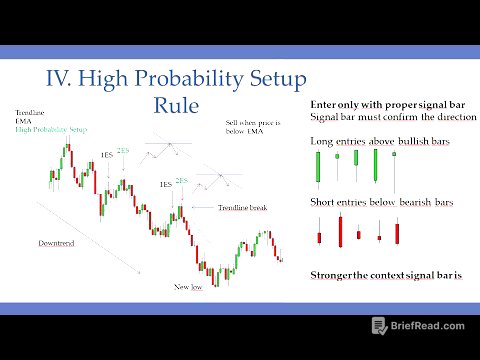TLDR;
This video emphasizes that effective communication is a skill that can be trained and is crucial for making a positive first impression. It highlights the importance of clarity, structure, and authenticity in speaking, as well as the power of listening and understanding the listener's perspective. The video also discusses techniques for managing confidence, handling pressure, and persuading others, ultimately advocating for a lifestyle of thoughtful communication that stems from inner clarity and personal responsibility.
- Speaking intelligently is a skill that can be trained.
- First impressions are significantly shaped by how you speak.
- Clarity, structure, and authenticity are key components of effective communication.
- Listening is as important as speaking.
- Confidence can be built through practice and managing emotions.
- Preparation is essential for handling high-pressure communication scenarios.
- Persuasion involves understanding and connecting with the listener's emotions and logic.
- Storytelling is a powerful tool for conveying complex ideas and building connections.
- Smart communication is a lifestyle that reflects inner clarity and personal responsibility.
The Power of Voice and First Impressions [0:00]
The way you speak significantly shapes first impressions, outweighing factors like IQ or education. Your voice is a tool that can be trained to make you appear credible and worth listening to. Studies show that people form impressions within the first 200 milliseconds of hearing a voice, emphasizing the importance of tone, clarity, and word choice. Speaking intelligently means being accurate, clear, and truthful, not necessarily using complex vocabulary.
Understanding the Listener's Brain [2:17]
Effective communication involves understanding how the listener's brain works, guiding them with structure and demonstrating knowledge and purpose. Smart speakers avoid self-promotion and focus on clarity, mastering the art of pausing, choosing the right words, and conveying appropriate emotions. Listeners judge you by how you express ideas, not just by what you know, and confident, clear delivery can influence decisions. Preparation and rehearsal are essential for smart speakers, who respect silence and understand its impact.
The Neuroscience of Trustworthy Speech [5:56]
Neuroscience reveals that humans are drawn to rhythmic clarity and easily processed words, not complex vocabulary. Coherent, purposeful, and rhythmic speech leads to perceptions of trustworthiness, intelligence, and credibility. The brain seeks structure and releases dopamine when it hears a steady voice with natural pauses and accessible language. Top TED speakers control pace and emotional flow, using pauses strategically to allow messages to sink in.
The Impact of Tone and Emphasis [8:04]
Tone delivers emotion and shapes reactions, with volume and emphasis guiding the listener's brain. Stressing different words in a sentence can completely change its meaning. Breath and sentence breaks also convey meaning, with steady breaths inspiring trust. Martin Luther King Jr.'s speeches exemplify the power of cadence, tone, and emotion. Speaking slightly slower with intentional intonation and timely pauses leads to perceptions of intelligence and trustworthiness.
Three Core Principles for Effective Speaking [10:57]
Three core principles for effective speaking are: speaking a bit slower to allow listeners to keep up, emphasizing key words to guide attention, and knowing when to pause for impact. Mastering these principles creates "music" in communication, pleasing the brain and opening the heart. Using your voice to stir emotion, organize thought, and guide conversation is key to making any room fall silent when you speak.
The Power of Simplicity [12:14]
Speaking intelligently means expressing deep ideas in simple language, avoiding academic jargon and long-winded sentences. Sharp thinkers aim for concise and accessible messages, speaking to convey rather than impress. Simplicity demands sharper thinking and the discipline to strip away unnecessary elements. Powerful communicators use short, clear words that hit hard, focusing on unlocking something in the listener.
Practical Tips for Speaking Simply [15:27]
To speak simply, listen to yourself and find shorter ways to express ideas without losing meaning. Use strong verbs and cut unnecessary words to sharpen your message. Imagine explaining a concept to a 10-year-old to ensure clarity. Clarity is the strongest weapon in communication, making you easier to understand, trust, and remember.
The Importance of Structure [17:08]
A structured message, with a clear beginning, climax, and end, creates an unforgettable imprint on the listener's mind. Intelligent speakers design their words like architects, with a firm foundation and clear framework. Structure keeps you from rambling and helps the listener feel guided. The simplest model is introduction, main content, and conclusion, a structure used by leaders in various fields.
Techniques for Structuring Your Message [19:39]
Effective strategies for structuring your message include the rule of three, using signposts to guide the listener, and storytelling to convey complex ideas. Stories connect emotionally and lead to a lesson or action. Structure is essential in formal situations to prevent rambling and show depth of thought. Practice structure in small conversations to build the habit of ordered thinking.
Building Confidence in Your Voice [23:12]
Confidence is built through conscious repetition and facing inner fears, not a random gift. Manage nervousness by beginning to speak even when unsure, adjusting your stance, and making eye contact. Your tone of voice reflects your internal state, so avoid rising pitches and fillers. Confident communicators lower their tone at the end of a sentence and use silence strategically.
Practical Steps to Cultivate Confidence [26:11]
Cultivate confidence through small wins, such as offering feedback or asking questions. Record your voice to refine it and build a new reflex map in your brain. Use visualization to imagine yourself speaking clearly and calmly. See moments of trembling as proof of stepping outside your comfort zone. Don't wait for validation; build self-belief by daring to speak up for what you believe in.
The Power of Listening [28:32]
Great communicators are also great listeners, setting aside their ego to understand the person in front of them. Listening earns more respect than sharp arguments and sends a message of connection and understanding. Skilled listeners analyze tone, sense emotion, and observe without rushing to argue. Genuine listening gives others the space to be fully themselves, creating loyalty and magnetism.
Practical Listening Skills [30:38]
Smart listening conserves energy and allows you to respond with awareness. Pause and ask questions to understand criticism and diffuse tension. In interviews and sales, good listeners identify needs and respond strategically. Be fully present by putting down your phone, making eye contact, and reflecting with simple sentences. Use 50% of your energy to observe, 30% to sense, and only 20% to speak.
Eliminating Weakening Phrases [33:36]
Avoid phrases that weaken your message, such as "I just think that" or "I'm not entirely sure, but." These phrases apologize for your presence and lower your value. Smart communicators speak with respect for themselves and understand that silence carries more strength than meaningless sound. Fillers are symptoms of internal uncertainty.
Crafting Strong Openers [35:17]
Weak language hides in openers like "I'm not an expert, but," which cuts your authority in half. Share ideas without apologizing for their existence. Use stronger openers like "I have one more point to contribute" or "I suggest we try this approach." Clarity comes from bringing content into the open without hedging.
Practical Steps to Strengthen Your Speech [36:46]
Record yourself speaking to identify unnecessary words and phrases. Master the pause instead of filling space with fillers. Craft stronger openers to anchor your presence through words. People remember how you make them feel, so avoid apologizing or shrinking your presence. Use language as a mirror reflecting the clarity of your thinking.
The Power of Authenticity [38:34]
People remember you if they feel the truth behind your words. Speak in alignment with who you truly are, entering the honest territory of what you actually think and feel. Authenticity means choosing what's most true to you and bringing that into the conversation without wearing a mask. Speak from real experiences, wounds, and mistakes to build trust.
Living Authentically in Communication [40:19]
Authenticity lives in your natural voice, not in imitating someone else. Speak with a voice that hasn't been filtered for mass approval. Express what you think without disguise while taking full responsibility for its impact. Stop trying to impress and start sharing something you've lived. Speak from a heart sculpted by lived experience, and your words will linger.
The Importance of Preparation Under Pressure [43:36]
Communication skill is revealed in high-pressure moments, such as job interviews or difficult conversations. Preparation is key to standing steady in challenging circumstances. Clarify your goal, organize your thoughts, and train the reflex of calmness. Define what you want the person to understand, feel, and achieve.
Techniques for Maintaining Composure [45:14]
Rehearse emotional steadiness by visualizing yourself speaking clearly and calmly. Cognitive priming helps your brain familiarize itself with the situation. Slow down your speech, use short sentences, and well-timed pauses to regain control of the space. Respond with curiosity instead of counterattack to de-escalate tension. Practice these techniques to communicate powerfully, even with a racing heart.
The Art of Persuasion [48:30]
Persuasion is helping others voluntarily shift their mindset without feeling manipulated. Make them feel heard and care about what they think. Guide listeners from feeling to awareness with emotional clarity. Share personal experiences to create a sense of shared ground. Center the listener with open-ended questions that benefit them.
Guiding Conversations with Influence [50:33]
Influence requires the right words at the right moment and a grounded presence. Inspire others to change themselves by making them feel seen, understood, and trusted. Listen, distill, and respond with respect, recognizing different angles. Frame questions subtly and use intentional pauses to create impact. Awaken what already exists within the listener.
The Power of Storytelling [53:11]
Storytelling is a powerful emotional weapon that builds an invisible bridge between speaker and listener. Share real experiences, lived emotions, and truths that cannot be faked. Choose the right details and leave space for the listener to fill in the rest. Tell stories like you're reliving them, with full presence.
Crafting Meaningful Stories [56:01]
Don't fear vulnerability in your story; it's the raw, imperfect parts that make others see themselves in you. Share wounds from a place of healing. Let your message live as a whisper at the end of the story. Guide listeners to see themselves and let the reflection do the work. Use storytelling to lead meetings, inspire teams, and connect human to human.
Communication as a Lifestyle [58:13]
Communication is the continuous expression of your presence, shaped by how you think, feel, and treat others. It's not a performance but a way of life that leaves a lasting impact. Your tone, gaze, breath, language, and focus reflect who you are in that moment. Live with clarity, purpose, and kindness to speak with clarity, weight, and safety.
Living with Thoughtfulness [59:21]
Make smart communication a lifestyle by focusing on the smallest details, such as how you say thank you or apologize. These are automatic responses formed by your internal values. Choose to live with thoughtfulness, and every word you speak will naturally carry maturity, compassion, and credibility. Refined communication begins within.
The Essence of Powerful Communication [1:00:30]
Powerful communication comes from the quality that radiates from your very being. Manage the emotional space you create and speak to connect, clarify, illuminate, and heal. Practice grace in daily conversations and be kind to yourself. Make smart communication a lifestyle, and your presence will command quiet respect. Live in a way that becomes your most persuasive argument.









